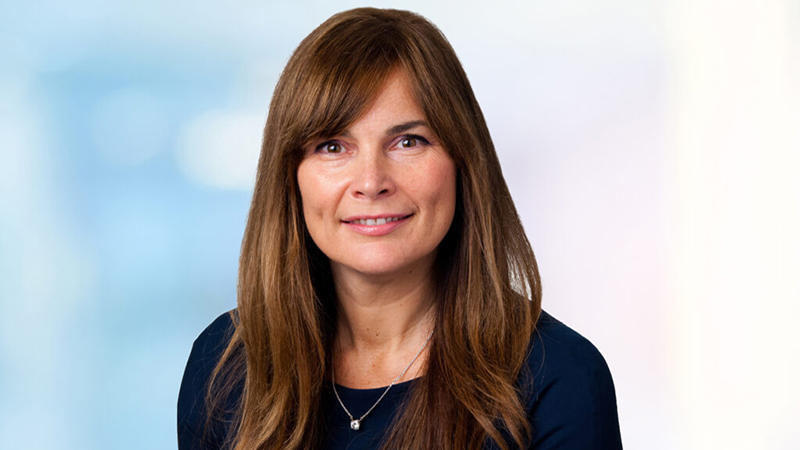Harriet Steel does not actually paraphrase Harold Macmillan as she considers the evolution of the investment sector over the past decade – and the thought may not necessarily have occurred to every single asset management client in the country – but, as the Federated Hermes head of business development goes on to demonstrate, there is a good argument to be made that UK retail fund investors have never had it so good.
Steel began her investment career at Bankers Trust in 1990, moving to Morgan Stanley six years later before setting up Portico Advisors, an asset-raising and marketing advisory firm for alternative investment managers, in 2003.
She joined the then Hermes Fund Managers in 2011, taking on responsibility for sales, client service, marketing, communications and product strategy, and was appointed to the board two years later.
“One big positive of the past 10 years or so is there is now more awareness and transparency afforded to the most important piece of the asset management value chain, the end-investor, who we are ultimately here to serve,” says Steel.
“That has been driven by a number of factors – including, obviously, regulation. The UK has led the way there with the Retail Distribution Review (RDR) and more transparency around costs and services.
“Then, in terms of the intermediary piece, greater wealth accumulation has seen an expansion of the intermediary market, which in turn has led to consolidation and an improvement in professionalism.
“Generally, then, it is a better environment for investors than it has been before – and they are being served by better and more professional intermediaries.”
Creative destruction
If you were looking at investment as a zero-sum game, Steel suggests, you might argue it has been the asset managers that have lost out in this equation.
“We are probably paying away more to the intermediaries than ever before and the bar is set much higher in terms of regulatory costs, operational costs and so forth,” she continues.
“Not to say that is a bad thing.
“You may be surprised to hear me say that, but the sorts of margins asset managers grew used to as a relatively young industry were probably not sustainable anyway. The sector just needs to accept the fact the days of pumping whatever it did through various networks with less scrutiny, less due-diligence, less regulation and fewer questions asked are a thing of the past. And, as I say, that is probably for the better.
“Alongside a more professional intermediary landscape and a better-served end-investor community then, asset manager businesses have experienced some creative destruction. It has become more competitive for us, which means we need to be more focused and more differentiated.”
That of course, is rather easier said than done in asset management, so how does Federated Hermes look to set itself apart from the crowd?
“Just stepping back a level, a fair amount of the creative destruction I mentioned has come through the rise of passive investing,” Steel replies.
“There were a lot of active asset managers – or asset managers who called themselves active – who were charging rich fees but were very undifferentiated to much cheaper solutions that could be delivered through passive investing.”
This is something the firm has acknowledged through its own strategy work.
“Obviously, we are part of a much larger group now but, back in 2014, we were in the throes of commercialising a business that had been an in-house asset manager for a pension scheme. So, we took a long, hard look at ourselves and aimed to back ourselves in areas where we felt we were able to deliver appropriate value that merited active fees.
“We undertook a huge restructuring and part of that was letting go of a number of investment strategies we felt had no place in the line-up of an active asset manager’s value proposition, judging those risks were more efficiently and cheaply accessed passively. Now, looking forward, investors are faced with a whole host of other challenges – not least what to do about ESG and some of the bigger existential risks we are facing.
“In terms of our own differentiation, then, it is really around our authenticity. We have been delivering long-term financial performance while seeing ESG and as an embedded part of that, not as something separate. That has always been a part of our fundamental belief system and, because we have been doing this for a long time, we have been able to think hard about how it can add value to long-term performance.
“As an example, we have an engagement team that helps the companies we invest in build business models that are more sustainable – with a small ‘s’ – but also to be more sustainable themselves. And we have been working to develop our own range of proprietary tools to enable us to harness the qualitative and quantitative data we are able to gather towards achieving financial as well as other non-financial outcomes.
“I would argue we are authentic in the ESG space and genuinely see it as an important driver of longer-term outcomes for investors. The world has moved on incredibly rapidly and we have had to adapt, but we now have a much broader church of clients who want to understand how best to make their money count and invest in a way that is going to enhance long-term performance.”
Nuanced ESG
ESG-oriented investing has certainly been evolving quickly over the past few years, and now, in the wake of Russia’s invasion of Ukraine, it must seek to balance achieving as low a carbon and environmental footprint as possible alongside energy availability, affordability and security. Is there a more nuanced, even pragmatic, aspect of ESG investment emerging?
“I think there is,” Steel agrees. “The last few years have been extraordinary in that, with Covid-19 and Ukraine we have now been faced with two existential threats playing out in real time in front of our eyes. Obviously, the war has brought the energy issue into sharp focus – how vulnerable we are and the challenges that lie ahead of us – but that does continue to make the case for a thoughtful and structured transition.
“Arguably, it has been a dose of reality for both sides. For the sceptics, who have now seen energy prices rise to the point they are driving inflation and the knock-on effect that might have on other sectors, it really does underline the economic validity of exploring other options beyond hydrocarbons. For those on the other polarity, it has also shown you cannot just switch off the taps overnight.”
Tools of the trade
Turning to the options available for investors looking to build a more ESG-oriented portfolio, how does Steel see the asset class toolbox evolving?
“The need to diversify and broaden ESG allocations across a wider range of asset classes is certainly something we are hearing from clients and, for example, we would expect private markets to play an increasingly important role, even in the wealth and retail channels,” she replies.
“People are looking to move away from what have been the traditional benchmark building blocks of equities and credit and towards more defined outcomes and more flexible and unconstrained investment approaches. And, of course, this is really the domain of active management and differentiates you from passive investing, where you could much more cheaply access, say, a US equity or high-yield ETF.
“So, the important but different roles that both alpha and beta have to play in delivering desired client outcomes is one consideration here.
“Then there are the ESG and sustainability angles of, first, how you protect your long-term returns from the existential risks and, second, potentially harness the opportunities that will result from economies in transition.
“Now, that may be challenging from a short-term perspective, as energy prices rise and impact portfolios are light on carbon and light on energy. However, most of our investors have a longer-term outlook and do accept this possibility. Plus they are offsetting that by accessing really powerful growth opportunities that are delivered out of the transitional economy and the move towards a more circular economy.
“These opportunities have to become an integral part of longer-term risk management, leveraging the higher-growth scenarios to counterbalance any underperformance due to the current energy-price situation. Still, thinking on a three to five-year horizon, there are some massive secular trends that should allow the capture of substantial new growth opportunities, in both public and private markets.”
Winner and losers
Looking further ahead still, how does Steel see the UK asset management sector evolving over the next decade?
“I don’t think we will recognise it, at least, I hope we won’t!” she replies. “In a rapidly consolidating and competitive market where everything is becoming more expensive, one thing that will set the winners apart from the losers will be a really forward-looking technology strategy.
“In 10 years’ time, I do not think the sector will even be selling funds. Instead, I think the investing ecosystem will be divided into three areas and some businesses will play in one, some in two and some that are big enough will be able to span all three.
“At one end of the spectrum, there will be the ‘alpha factories’, the firms that specialise in delivering alpha through whatever asset class or medium they operate in. In the middle, you will have the ‘solution assemblers’ – which is where the alpha and beta building blocks come in – but they will be accessing it directly.
“The alpha will be fed in through trade ideas rather than in dilute format through funds where you are buying a mixture of alpha and beta, sometimes with a bit of leverage thrown in.
“And then there will be the ‘distributors’, businesses like the global financial institutions who are currently working with alpha factories to assemble solutions and then distributing them. Only the end-users will be buying solutions directly and technology and AI will play a big role in defining those solutions based on their individual preferences.
“After all, why is it that Amazon is able to come up with 10 books I want to buy while my wealth manager struggles to ascertain and deliver my investment needs? So, technology will play a crucial role in the scalable delivery of much more bespoke solutions than the retail chain and this rather clunky process of asset managers creating funds and then going out and selling them will come to an end.
“Maybe we are looking at 20 years rather than 10 but, rather than through reporting and factsheets, data will be fed in directly between different parts of the ecosystem.
“Beta will continue to be an important building block in the assembly of these bespoke solutions while – thankfully for the winners of the current asset management sector – you are probably still going to need the alpha factories as part of that ecosystem.”
QUICKFIRE Q&A
What is the best piece of advice you have ever been given?
You can’t do it all by yourself so identify where you need help and hire the best people you can.
What is your ‘top tip’ for professional investors to help them run a better business?
Businesses now need to deliver value beyond financial performance, which means delivering intellectual and relational capital, too. Identify your strategic partnerships and then work hard to understand them and deliver the outcomes they want and need.
What single issue should most concern professional investors at present?
We are on the cusp of some fairly fundamental change at the geopolitical and macroeconomic level so the ways we have typically done things in recent decades will no longer be fit for purpose. I do think the investment community recognises this and understands it will bring not just challenges but also immense opportunity, not just for us as an industry but for the world as a whole.
Does anything about your job keep you awake at night?
I have learned only to worry about things I can control. Since business challenges can be navigated if you have the right people and the right culture, I worry about attracting and retaining talent and making sure we support a healthy culture that helps inspire and mobilise them.
And what most excites you about your job?
Working with very talented people, be they colleagues, clients or other participants in the industry.
If you were in charge of the FCA, what would be your priority?
The UK is one of the leading asset management jurisdictions in the world so my guiding North Star would be creating an environment that ensures it continues as such and thrives.
And what advice would you give to someone starting out in investment today?
As an industry, we have a great role to play in helping normal people retire better and bringing societal benefits. Plus, it is a great place to work – and better than it ever has been for women and other minorities – so don’t ignore the sector because of the poor PR job we do.
BREAKFAST OF CHAMPIONS
Culture may eat strategy for its most important meal of the day, as management guru Peter Drucker colourfully observed, but Harriet Steel suspects everyone could be better served if the pair sat down to breakfast together.
“Everyone in financial services had their wrists slapped because of the 2008/09 global financial crisis and its fallout, and with good reason,” she begins.
“An interesting point there, however, is that asset management businesses were by no means the worst culprits yet – in the perception of our end-investors and the wider public – we were definitely all tarred with the same brush. In terms of how you are perceived as a business, then, culture is very important, and it is even more so when it comes to building a successful organisation.
“At its heart, culture is a collection of behaviours – how people interact with each other – and since we are a people business, that is everything. Ultimately, culture is a set of people with the same value systems and the more consistency you have across those, the easier it is to build a better culture. Still, culture is about more than behaviour, which is why the old adage of it eating strategy for breakfast is only a starting point.
“If you really want to build and leverage a high-performing organisation, proper culture needs to go hand in hand with strategy. That is because, to deliver the right culture, you have to have the right vision and the right purpose and then you can have a strategy, or a roadmap of how you achieve that. It allows everyone to understand the role they play in hitting that objective while making them feel truly part of that higher purpose.
“So, culture and strategy are not mutually exclusive, along with vision and purpose, they go hand in hand in enabling the development and evolution of a strong, optimised corporate culture. Each person knows they are playing an important role in achieving that higher purpose, delivering against that vision and implementing that strategy to get there. That is how you move beyond an objective of financial survival or financial performance towards being an organisation that will be better at attracting and retaining the best talent.
“In a way, it is like carbon emissions and biodiversity, you cannot separate them out. And you cannot separate strategy from culture, they work better hand in hand, where everyone understands the strategy, the vision, the mission and has the right set of values and the ability to work together towards those ends, while understanding where they fit into the overall picture.”
THE POWER OF THREE
Since Harriet Steel joined the then Hermes Fund Managers in November 2011, she and Saker Nusseibeh – who was appointed CEO the same month – have worked together through three different ownership structures. There has been something of a cumulative benefit here, she believes, explaining: “If I think back to when we were 100% owned by the BT Pension Scheme (BTPS), for example, that has given us a real institutional heritage.
“Delivering more of a holistic offering for one client at the beginning has helped us to work in partnership as the intermediary space has evolved and professionalised. So we wear that part of our past with pride. As we moved towards being a bona fide third-party business in 2016/17, however, we saw this ownership structure would not work properly, either for the pension scheme or for us as an investment manager.
“When Federated acquired us in 2018, they bought only 60% of the business because the pension scheme at that point wanted to retain a minority shareholding. As such, for three years we went through a hybrid model where we were majority owned and able to work on mutually beneficial initiatives from a distribution and product perspective.
“Culturally, though, now we have gone through the full transition and Federated has bought out BTPS’s residual shareholding, we have been able to focus on how we leverage ourselves globally. It has accelerated co-operation between colleagues on both sides of the Atlantic.”
Steel describes the deal as “very much a strategic acquisition” for the then Federated Investors, adding:
“There was minimal overlap in terms of investment strategies and distribution. Federated was a very money-market-centric firm with clients mostly in North America, so it allowed them access to our more international client base and distribution, and substantially increased their range of active investment management.
“Then they saw our expertise in ESG and shareholder engagement as a strategic plus. They could see that, even in the US, which was slightly behind Europe in terms of client appetites, this was something they had to get their arms around. As a group, I would argue we have the best ESG-integrated money-market business out there, because our colleagues in the States took it very seriously indeed.
“Furthermore, the money-market business is an important counterbalance to the active equities and fixed income businesses. We diversify each other. There are years where both go well but we have had years – for example, quite recently – when rates were moving to negative levels across a number of different economies, where fee waivers were having to be paid in money markets.
“That was obviously a very challenging time for the money-market business but it was a high-growth time for our active businesses, particularly in some of our thematic and flexible fixed income strategies, with that sustainable tailwind to help us as well. So, while we don’t ever want to forget our heritage because it has made us who we are and benefited us, the time was right to change and now we should benefit in a different way.”
This article first appeared in the May edition of Portfolio Adviser Magazine








